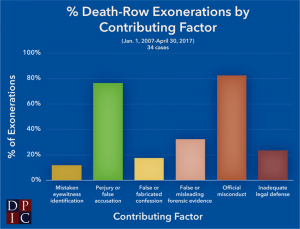Official misconduct by police and prosecutors and perjured testimony (not errors) are the number one contributing factor to wrongful homicide convictions according to data from the The Death Penalty Information Center. The report summarizes data from the National Registry of Exonerations annual report on wrongful convictions. In 2018, they recorded a record 151 new exonerations across the United States, including 68 exonerations resulting from wrongful homicide convictions. Two of those exonerations freed death-row prisoners.
A record number of the exonerations in 2018 were the product of wrongful convictions obtained by police and/or prosecutorial misconduct (107) or perjury/false accusation (111), with both often occurring in combination. The two also were the leading factors contributing to wrongful homicide convictions, 79.4% of which involved police and/or prosecutorial misconduct (54 cases) and 76.5% of which involved perjury/false accusation (52 cases). Historically, those two factors are the leading causes of wrongful capital convictions. Both were present in more than two-thirds of the homicide exonerations (47 cases, 69.1%) in 2018, including the wrongful capital convictions of Benavides and Aquirre. DNA evidence helped to exonerate 14 of those wrongfully convicted of homicide in 2018, only 20.1% of homicide exonerations. The prosecution presented perjured testimony or false witness accusations in all of the murder cases involving DNA, and police and/or prosecutorial misconduct was also present in more than 60% of those cases. DNA helped to rebut false or misleading forensic evidence presented by the prosecution in five of the homicide exonerations.
The Death Penalty Information Center has examined our exoneration database and cross-referenced it with the National Registry of Exonerations information on death-row exonerations in the last decade (between 2007 and April 2017) to determine the most common factors that contributed to the wrongful convictions and death sentences for the most recent exonerees. The data for the 34 cases in the NRE database shows that the wrongful capital prosecutions involved more than mere errors. Every one of these cases involved some combination of official misconduct, perjury or false accusation, or false or misleading forensic evidence; and more than three-quarters (26 cases, 76.5%) involved at least two of these factors. Fewer than one-tenth of the cases (3, 8.8%) involved a single wrongful cause. 91.2% (31 cases) had multiple contributing factors and nearly half (16 cases, 47.1%) had three or more contributing causes.






